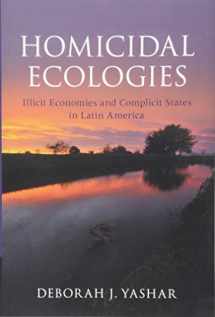
Homicidal Ecologies: Illicit Economies and Complicit States in Latin America (Cambridge Studies in Comparative Politics)
Book details
Summary
Description
Product Description Why has violence spiked in Latin America's contemporary democracies? What explains its temporal and spatial variation? Analyzing the region's uneven homicide levels, this book maps out a theoretical agenda focusing on three intersecting factors: the changing geography of transnational illicit political economies; the varied capacity and complicity of state institutions tasked with providing law and order; and organizational competition to control illicit territorial enclaves. These three factors inform the emergence of 'homicidal ecologies' (subnational regions most susceptible to violence) in Latin America. After focusing on the contemporary causes of homicidal violence, the book analyzes the comparative historical origins of weak and complicit public security forces and the rare moments in which successful institutional reform takes place. Regional trends in Latin America are evaluated, followed by original case studies of Central America, which claims among the highest homicide rates in the world. Review ‘A brilliant example of how careful social science research can illuminate the most pressing problems of our times, Homicidal Ecologies shows why democracy and the end of civil war didn't bring peace to Latin America. Rather than resulting from economic inequality or weak democratic institutions, homicidal violence soared along the routes of the Continental drug trade where cartels compete and the state is too weak or corrupt to rein them in.' Andreas Wimmer, author of Nation Building: Why Some Countries Come Together While Other Fall Apart‘Latin America has the highest homicide rates in the world. Homicidal Ecologies offer a comprehensive portrait of violence in the region, and a broader theory of illicit markets, state capacity, and their responses to structural conditions and organizational incentives. It will prove indispensable not only to Latin Americanists but to students of violence and political development more generally. This book's importance cannot be overstated. It is a must-read.' M. Victoria Murillo, Columbia University'Civil war and dictatorship have virtually vanished in Latin America. Yet in many parts of the region, violent death remains a part of daily life. Through awe-inspiring data collection and encyclopedic area expertise, Deborah J. Yashar provides a granular descriptive picture of Latin America’s homicidal ecologies. She convincingly demonstrates that homicide levels have skyrocketed in zones where state weakness and corruption spawn deadly competition to control the transit of illicit goods.' Dan Slater, University of Michigan'Homicidal Ecologies is a pathbreaking account of the tragic surge in violence in post-civil war Central America. Yashar breaks new theoretical ground in explaining how criminal violence is related to illicit economies, state capacities, and organizational competition over territorial enclaves and transportation routes. This book is essential reading for anyone who seeks to understand the deep societal roots of violence in Central America, and why some countries are more susceptible to it than others.' Kenneth Roberts, Cornell University, New York'In this eagerly anticipated book, Deborah J. Yashar takes up one of the most critical challenges facing Latin America today: how to understand the violence that has plagued the region after democratization. Showcasing Yashar's deep knowledge of Central America, Homicidal Ecologies explains this violence as the result of competition between organizations over the control of territory - an argument that is especially compelling because it draws on transnational, national, and subnational levels of analysis.' Kent Eaton, University of California, Santa Cruz Book Description Latin America has among the world's highest homicide rates. The author analyzes the illicit organizations, complicit and weak states, and territorial competition that generate today's violent homicidal ecologies. A


We would LOVE it if you could help us and other readers by reviewing the book
Book review



